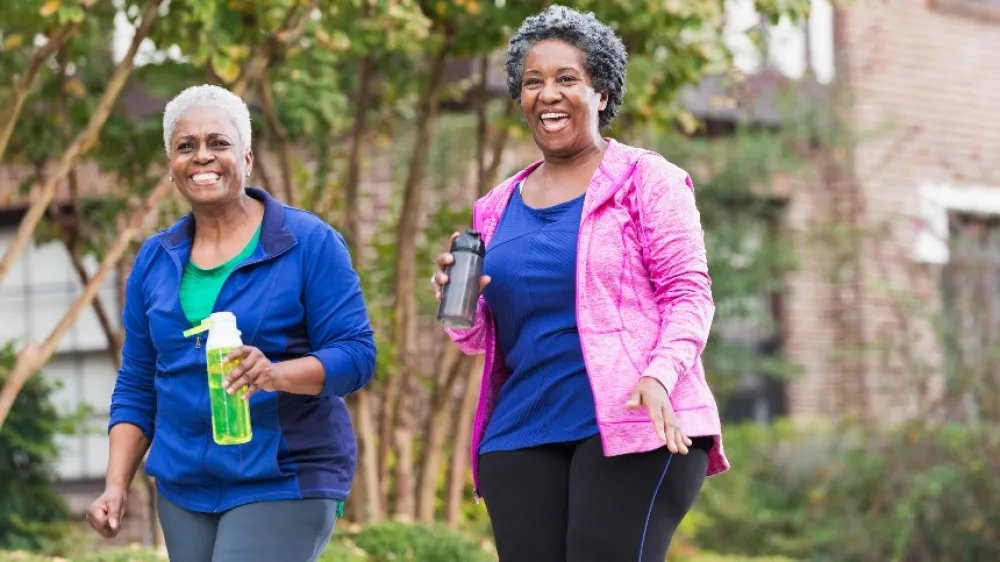Providing your location allows us to show you nearby locations and doctors.
Top 5 Things Seniors Need to Know to Stay Healthy this Summer

05/01/2022
By Dr. Allison Ostroff, Director of Healthy Aging Program, Nuvance Health
Summer is a great time to get active and enjoy the outdoors. However, summertime weather can also pose health challenges for adults age 65 or older. As the days get hotter, seniors may become frequently dehydrated, have trouble getting their daily exercise, or feel stuck indoors to avoid the heat.
Here are the top five things adults age 65 or older need to know to have a healthy and safe summer.
1: Pay attention to COVID-19 risks
People age 65 or older are at an increased risk of experiencing serious complications related to COVID-19 due to their age and common underlying conditions like diabetes and heart disease. That is why it is especially important for seniors to consider the risks of COVID-19 infection before participating in summer activities. To decide which activities are appropriate, seniors should consider their individual comfort and risk due to age or medical conditions, and the risk of catching COVID-19.
Thankfully, COVID-19 transmission rates have declined due to vaccination and more opportunities for outdoor activities during warmer weather. However, it is still important for seniors to stay current about COVID-19 to make informed decisions about where they travel.
We know outdoor activities carry less risk of COVID-19 transmission than indoor ones. Seniors should take advantage of the outdoors and get as much socialization as possible. Socialization is key to happiness, well-being and maintaining a healthy memory.
Do you need primary care for yourself or family? Go here to find a healthcare clinician near you and book an appointment online.
2: Get exercise
Exercise is important all year round and for people of all ages. Thirty minutes of regular exercise each day can help seniors strengthen their core and reduce the risk of falls or injury. Exercise is also good for their heart and may help boost the immune system.
Summer is a great time to explore new types of exercise. For example, aqua aerobics (aerobic exercise in a shallow swimming pool) is a fantastic summertime activity. The resistance from the water strengthens muscles. It is usually a safe and effective exercise because it is low impact and the water helps stabilize the body. Water aerobics is especially beneficial for people with osteoporosis who are at greater risk of fracturing a bone from a fall.
Sometimes it might be too hot to walk outside safely. To maintain a daily walking routine, seniors may want to find an indoor, air-conditioned (AC) location, like an indoor track or a mall. Seniors can also walk up and down the stairs in their home as long as they feel stable and there is a railing. They can also walk throughout their home as long as they have a clear path free from tripping hazards like area rugs or end tables.
Dr. Allison Ostroff is an internal medicine doctor at Nuvance Health Medical Practice Primary Care in Brookfield, Conn. Book an appointment online with Dr. Ostroff.
3: Stay cool and hydrated
Summer heat can be dangerous for everyone, but seniors are particularly vulnerable to dehydration, which can lead to heat stroke. Older adults may have more difficulty regulating their internal temperature or producing the sweat they need to cool down. As people age, it is common for the senses to be dulled, so they may not feel thirsty. In fact, the thirst center of the brain "turns off" when we are in our mid-70s. Further, medications seniors take for common health conditions like high blood pressure may make them prone to dehydration.
The increased risk of dehydration means it is important for seniors to stay cool and hydrated. Also, remember that alcoholic and caffeinated beverages can cause dehydration. Water is usually the best choice to stay hydrated. Seniors can speak with their doctor about the ideal amount of water they should drink each day. They can also ask their doctor if changes to their medications are necessary to help keep them hydrated.
It is important for seniors to have a reliable AC system at home, or access to a safe place with AC where they can go during the day.
Seniors should be especially wary if they experience blurry vision or dizziness, or if someone says they look unwell. They may be experiencing the early stages of heat stroke. If these symptoms occur, seniors should go to a cool place with AC, drink plenty of cool (but not ice cold) water or a sports drink (to boost electrolyte levels), and seek emergency medical attention.
4: Manage medications
Managing medications can be tricky at the best of times, but summer weather can make it even harder. The heat can damage medications and make them less effective or harmful to take. For example, pills left in hot and humid places can congeal together, become misshapen, or have a different smell or feel to them. If seniors notice any of these changes to their pills, they should ask their doctor or pharmacist if the medication is okay to take.
To avoid heat damage to medications, keep them in dry, room-temperature conditions that are no hotter than 60 to 70 degrees. A great place for medications is inside a bedroom nightstand.
5: Enjoy being outside
Spending 30 minutes a day outside is not only relaxing, but is healthy, too! I encourage seniors to find excuses to spend time outside this summer — walk the dog, go on a picnic or tour the neighborhood with a small group of loved ones.
The summer sun is great for getting Vitamin D, which is critical for keeping bones strong and decreasing the risk of falls. Even though the sun provides Vitamin D, it can cause harmful effects such as sunburn or eye damage.
Seniors may be especially vulnerable to the sun's rays because of thinner skin. Seniors can protect their skin by applying sunscreen with an SPF of at least 15 about 30 minutes before exposure to the sun, and then reapplying it according to the instructions.
Seniors should wear protective clothing like hats and lightweight cotton shirts and pants to protect their skin from the sun. They should also wear sunglasses with UV400 protection lenses, especially if they have eye conditions like cataracts or macular degeneration.
Other warm weather hazards include outdoor construction and cracks in the concrete from winter weather. These may be tripping hazards. Wear stabilizing shoes like sneakers and avoid sandals or any shoe with an open back.
Also be careful of insect bites — especially tick bites that can cause tick-borne illnesses such as Lyme disease. Seniors should check for ticks every night especially if they were gardening, hiking or outside in tall grass during the day.
Bottom line: Enjoy the outdoors and the possibilities that come along with the summertime!
